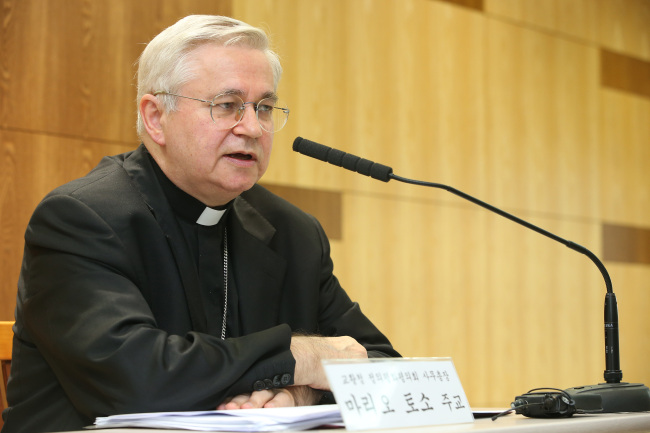Catholic churches are entitled to speak out on political and social injustices, a high-ranking bishop from the Vatican said Monday.
Speaking at a press conference in Seoul, Bishop Mario Toso, secretary of the Pontifical Council for Justice and Peace, stressed that churchmen are obliged to work for the redemption of all mankind, with this redemption including relief from social and political injustices.
“The more you love Christ, the harder you work for justice and peace in this world,” he added.
 |
| Bishop Mario Toso, secretary of the Pontifical Council for Justice and Peace, speaks during a press conference in Seoul on Monday. (Yonhap) |
In Korea, priests belonging to the council often face criticism for their involvement in social and political issues. They have recently gotten involved in controversial issues including a naval base under construction on the southern island of Jejudo, the installation of high-voltage power transmission lines in the rural town of Miryang, and the legitimacy of President Park Geun-hye’s victory in the 2012 presidential election.
“Korea is an amazing country. Its church is beautiful and strong, has a lot of martyrs and engages in a lot of activities.”
The bishop’s visit came days after the Vatican formally announced the detailed schedule of Pope Francis’ Aug. 14-18 visit to Korea, which will be the first papal visit to the country in 25 years.
Martyrs and young Asian believers are the focus of the pontiff’s visit here. The pope will attend a festival for young Asian Catholics, beautify 124 Korean martyrs and celebrate a Mass for peace and reconciliation in Seoul’s Myeong-dong Cathedral, while meeting President Park and Catholic leaders.
The pope’s only engagement with disadvantaged people in Korea will be his planned visit to Kkottongnae, or Flower Village, a welfare facility in Eumseong, North Chungcheong Province. Some priests have protested the planned visit, saying the facility, founded and run by Father Oh Woong-jin, has been associated with corruption.
“The pope is coming for a limited schedule. He has got to focus on some important events,” he said in response to local criticism that the pope’s itinerary here doesn’t reflect his persistent emphasis on the poor.
“What’s important is that Christians in this country are there for the poor and disadvantaged,” the bishop said.
By Lee Sun-young (milaya@heraldcorp.com)

